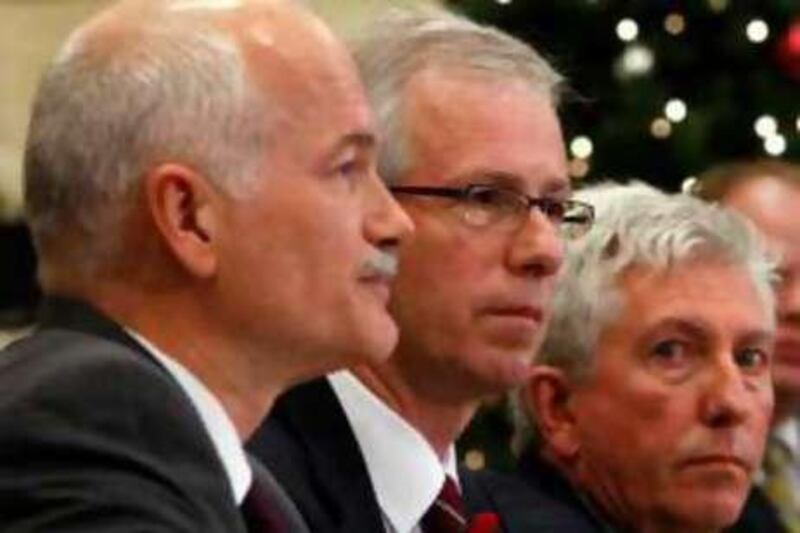VANCOUVER // Canada's right-wing government is in danger of falling to an unlikely coalition of leftists, centrists and Quebec separatists. It would be the first such alliance in the country's history. Many observers are blaming Stephen Harper, the prime minister, for backing his political rivals into a corner. He gambled that opposition parties would accept an unpalatable economic plan, because rejecting it would leave only the unpopular option of forcing the second election in less than two months. Mr Harper apparently did not expect to unite the centrist Liberals, separatist Bloc Québécois and the New Democratic Party (NDP), which has socialist roots, against his minority Conservative government.
"Harper has done an amazing thing in bringing the Liberals, NDP and the Bloc together," said Allan Tupper, a political scientist at the University of British Columbia. On Nov 27, Mr Harper presented parliament with an economic update seemingly designed to infuriate all three opposition parties. They were calling for a stimulus package to aid the faltering Canadian economy, but were instead offered a heavy-handed plan to cut public expenditures.
The plan would have limited public sector employee wage increases and curtailed their right to strike. It would also have ended public subsidies to political parties, which increases reliance on corporate and union donations. Analysts said scrapping the subsidies would hurt opposition parties but not the Conservatives, who are more successful at soliciting private donations. "The government just overplayed its hand," Mr Tupper said. "It was a very large gamble to take for no other reason than political partisanship." Desperate to save their government, the Conservatives have since backtracked on both measures and promised economic stimuli. But it may be too late. On Monday, opposition parties hope to topple the Conservatives with a vote of no-confidence. This past Monday, opposition leaders signed an accord laying out the framework for a Liberal-led coalition with the NDP that would last until June 2011 and provide a multibillion-dollar stimulus package. The Bloc Québécois, which wants the French-speaking province of Québec to separate from Canada, vowed to support the coalition until June 2010. "This is an attempt to impose an alternative government upon Canadians, a government that was not elected barely six weeks ago, and a government - a coalition - that is supported by separatists, people who would break up our country," Jim Prentice, the Conservative environment minister, told reporters. "This is a serious situation that is irresponsible, and it is undemocratic." Other Conservative MPs likened the move to a coup d'état. Mr Tupper said the coalition is unprecedented, but not undemocratic. Not only does it fall within the rules, but the House of Commons is obligated to bring down an administration it believes is not governing responsibly.
"At the end of the day, the government must have the confidence of the House," he said. "That principle is unshakable. This is a requirement for governance in Canada." The country has never been run by a coalition, although some Liberals left their party to join the Conservative-led Union Government during the First World War. "There's no deep Canadian experience with coalition governments, so it will be 'learn as you go' if it occurs," Mr Tupper said. During Monday's question period in the House of Commons, Mr Harper accused Stéphane Dion, the Liberal leader, of playing the "biggest political game in Canadian history", saying it would be reckless of him to face the global economic crisis while leading a coalition subject to the whims of "socialists and separatists". Less partisan voices have expressed similar fears. In a Monday editorial, the centrist Globe and Mail newspaper in Toronto condemned Mr Harper for "contributing to the political destabilisation of Canada", but warned: "That does not mean, however, that the interests of Canada would be best served by a Liberal-NDP coalition, propped up by separatists." The debate over Canada's political future has exploded into the public sphere in the past few days and activists on all sides are turning to the internet to mobilise support. Some are using the social networking site Facebook to publicise pro-coalition rallies, while the website Rally for Canada invites Canadians to demonstrate support for the Conservative government. Two sites were launched by anonymous groups claiming to be members of the Conservative Party who wish to replace Mr Harper. John Cummins, a Conservative MP, said he suspected pro-coalition activists were behind those websites. "They're trying to create dissension in the ranks," he said. Whatever happens on Monday will depend on Michaëlle Jean, Canada's governor-general and official head of state. Opposition parties sent a letter notifying her that they have lost confidence in the government. Mr Harper is expected to urge her to call an election rather than allow the coalition to govern, but many analysts say that is unlikely. Mr Harper has one more option: he could attempt to prorogue, to discontinue the session without dissolving parliament. Mr Tupper said that would diminish the Conservatives' credibility even further. "It would be seen as desperate. I think Harper will have to face the music." jferrie@thenational.ae






